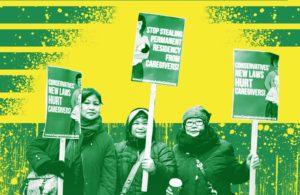 by Sharmeen Khan (Migrant Workers Alliance for Change) and Jackie Esmonde (Income Security Advocacy Centre)
by Sharmeen Khan (Migrant Workers Alliance for Change) and Jackie Esmonde (Income Security Advocacy Centre)
Long hours of work for little pay, the inability to take time off of work when personal emergencies arise, fear that speaking out about abuses will lead to deportation – these are the kinds of working conditions faced by many of the 200,000 temporary foreign workers in Ontario.
The proposed changes to Ontario’s labour laws found in the Fair Workplaces, Better Jobs Act (or Bill 148) have the potential to hugely impact their lives and well-being.
So how does the proposed Bill fare in terms of the lives and workplaces of migrant workers?
A $15 Minimum Wage Will Lift Many Migrant Workers out of Poverty
The Bill takes some important steps to address migrant worker precarity, including progress on personal leaves, and equal pay for temporary and part-time workers. A proposed $15 minimum wage is a cornerstone of this legislation and an important step towards lifting migrant workers out of poverty. Migrant workers are amongst the lowest paid workers in Ontario. They are a disposable workforce of predominantly Black or people of colour, whose skills and lives are seen as having little value.
Poverty in Canada is directly tied to poverty abroad. Migrant workers come to Canada in the hope of escaping poverty and despite their low wages, they send large portion of their earning back to their families.
Here are some other changes that can benefit migrant workers:
- Ten days job protected personal emergency leave – two of these days will be paid. Employers cannot require medical notes when you are off sick.
- Equal pay for equal work for seasonal workers – those seasonal workers that are doing a similar job as a full-time or permanent employee will be entitled to the same pay. This also applies to part-time, temporary agency and causal workers.
- Three hours of pay for cancellation of work shift with less than 2 days’ notice and the right to refuse a shift scheduled with less than 4 days’ notice.
These are important gains that must be protected. At the same time we urge the government of Ontario to take this opportunity to address the following areas:
- End exemptions: Only one quarter of workers in Ontario are completely covered by the minimum standards due to a complex web of exemptions. The proposed legislation does not address these exemptions, instead leaving the issue to a promised review in the fall. Many migrant workers fall within these exemptions. The Employment Standards Act sets the floor for the most basic workers’ rights – all workers should enjoy these rights. In the alternative, the legislation should strictly define the circumstances in which an exemption will be available.
- Stop illegal recruitment fees: In 2009, the provincial government took an important step by prohibiting recruitment fees. However, there are ongoing reports of recruiters demanding exorbitant and illegal fees from migrant workers. Effective enforcement and mandatory registration for recruiters and employers is required to ensure that migrant workers can take home their pay.
- Effective enforcement requires protection from repatriation for migrant workers: The important gains in the proposed legislation will be illusory unless enforcement is strengthened. MWAC welcomes government announcements about significant increases to enforcement resources. We urge the government to consider the particular vulnerabilities faced by migrant workers, who face immediate repatriation by unscrupulous employers if they complain. Working with the federal government to issue open work permits when complaints are made and allowing anonymous complaints would alleviate some barriers to enforcement for migrant workers.
- Caregivers and agricultural workers must have equal rights to unionize: Unions are the most effective way to ensure fairness and democracy in workplaces. Yet agricultural workers and caregivers – two industries that are rife with abuse – are excluded from the Labour Relations Act and thus have no effective way to unionize. We urge government to accept the recommendations of the Special Advisors and end these unfair exemptions.
If you would like to help improve the working conditions of migrant workers, please go to Migrant Worker Alliance for Change for resources and tool kits. Click for more information on how you can help with the Fight for $15 and Fairness.